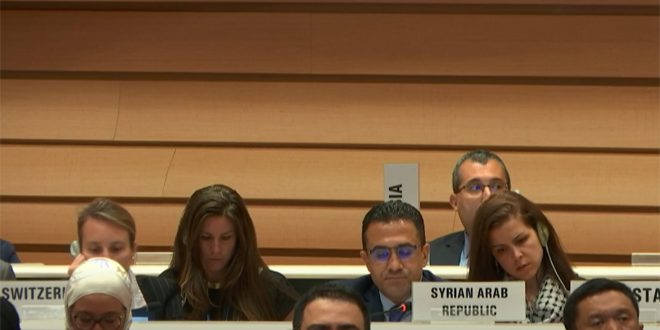World Health Assembly adopts a resolution on health conditions in the occupied Syrian and Palestinian territories
The World Health Assembly in Geneva adopted a resolution entitled “The health situation in the occupied territory, including East Al-Quds (Jerusalem) and the occupied Syrian Golan.” A number of delegates from Member States affirmed the solidarity of their countries with the Palestinian people and with the people in the occupied Golan, in the confrontation of war crimes and crimes against humanity committed by the Israeli occupation there.
The resolution adopted by Director-General of the World Health Organization during the 76th Session of the Assembly requested sending a field assessment mission to find out the health conditions of the people of the Syrian Golan under Israeli occupation, including prisoners in its detention centers, and to submit a report to the World Health Assembly in this regard.
Syria’s Permanent Representative to the United Nations Office in Geneva, Ambassador Haider Ali Ahmed, noted that the occupation authorities’ systematic discriminatory policies imposed by on people in the occupied Syrian Golan and the occupation’s practices to change the geographical and demographic character constitute a violation of the principles of the World Health Organization constitution, which emphasized the basic rights of people and individuals to enjoy health without discrimination and the importance of health for all peoples in order to achieve peace and security.
Ali Ahmed expressed Syria’s astonishment at WHO’s insistence on marginalizing the issue of health conditions in the occupied Golan in its reports. He noted that Syria welcomed the organization’s intention to conduct a field assessment of the health situation in the occupied Syrian Golan. Syria provided all facilitations to ensure that this assessment is conducted without any restriction by the occupying power, in accordance with its legal obligations under the Fourth Geneva Convention of 1949, as well as relevant Security Council resolutions, including Resolution No. 497 of 1981, which stipulated that the decision of “Israel” to impose its laws and jurisdiction on the occupied Syrian Golan is null and void and has no legal effect.
Ali Ahmed indicated that the decades-old Israeli occupation’s refusal to allow the World Health Organization’s (WHO) access to the occupied Syrian Golan also prevented the organization this year from implementing the resolutions and decisions of the World Health Assembly. Therefore the organization was unable to send its team and assess the health conditions in the Golan, and the director General did not mention in his report why the assessment mission was unable to reach. He underlined the need to grant the World Health Organization unconditional, unhindered and unrestricted access to the occupied Golan, to conduct a field assessment of the health conditions of our people there, and to suggest ways and means to provide them with humanitarian and health technical assistance, taking into account the absence of United Nations Humanitarian agencies in the occupied Syrian Golan.
Ali Ahmad highlighted the need to open Quneitra crossing, which connects the people of the occupied Syrian Golan with their families, especially students wishing to pursue their education in Syrian universities, because of its bad social and psychological impact on the people of the occupied Golan and their families in Syria alike.
Ali Ahmed indicated that the Israeli occupation continues its brutal attacks on the Palestinians, which recently resulted in the martyrdom of many children, women and the elderly in Jenin and Balata camps. Syria renewed its condemnation of these attacks and their deliberate and systematic bombing of hospitals, health care facilities, which were documented in the Director General’s report.
Ali Ahmed confirmed that these violations confirm the magnitude of the human tragedy caused by Israel’s aggressive practices, which requires everyone to provide protection for the Palestinian people, and mobilize international support for the already exhausted Palestinian health sector as a result of the policies and practices of the Israeli occupation authorities and their suffocating blockade of the Gaza Strip.
The Ambassador indicated that the resolution that was adopted is in line with the mandate and constitution of the World Health Organization, the Charter of the United Nations and its resolutions, and the rules of international law.
Inas Abdulkareem

